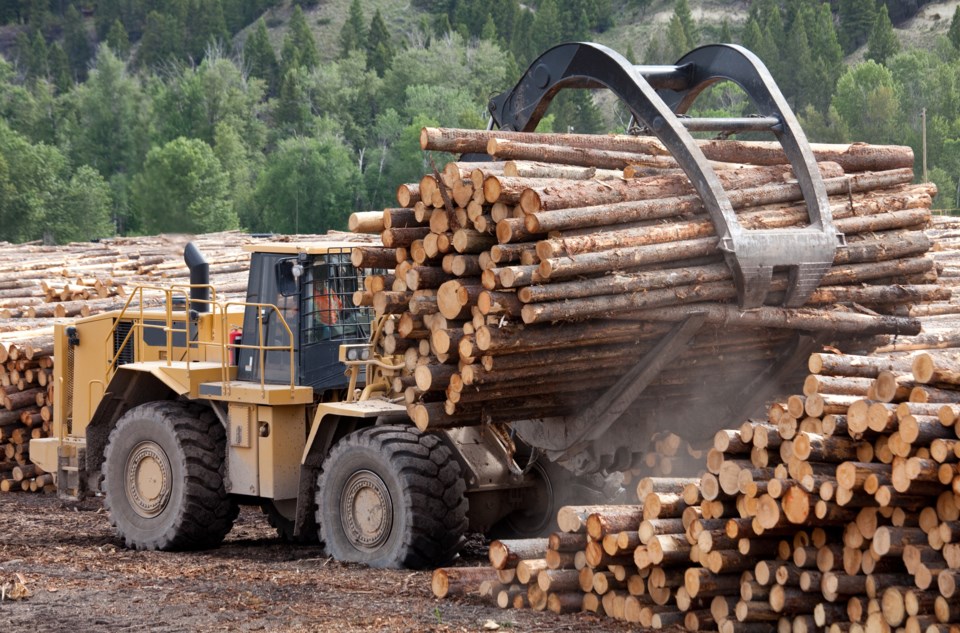The B.C. government has offered tentative praise to Ottawa’s new forest sector aid package, while also putting down an early marker that it expects to get the lion’s share of the money.
Forests Minister Ravi Parmar called the $1.2-billion financial package “welcome news” and “a lifeline” for a beleaguered sector battered by U.S. trade penalties and market conditions.
“My hope is that these dollars are just the start of a new relationship with the federal government on forestry, that we'll be able to continue to have further conversations about supports, about transforming this sector,” Parmar said in an interview.
Prime Minister Mark Carney announced the aid at a mill in Kelowna on Tuesday, pledging $700 million in loan guarantees to help companies restructure, $500 million in grants for diversification and $50 million for retraining more than 6,000 softwood lumber works.
“There are enormous opportunities for the softwood lumber industry,” said Carney. “And the investments we are making today will help that sector to take full advantage of those opportunities.”
He also promised to change federal procurement rules to prioritize Canadian lumber in public construction, part of a larger push to build the country using homegrown materials.
The announcement comes two weeks after the U.S. hiked anti-dumping duties on Canadian softwood lumber to 20.56 per cent. The overall rate is expected to rise to as much as 35 per cent, once the Americans unveil higher countervailing duties later this week. That’s on top of global economic uncertainty caused by U.S. President Donald Trump’s tariffs.
B.C., which produces a third of Canada’s softwood lumber and 40 percent of its exports to the U.S., is especially vulnerable.
“We are by far the largest sector in terms of employment [in softwood lumber],” said Parmar. “So I think between 40 to 50 per cent of the funding should be coming to British Columbia, without a doubt.”
The province’s claim on the cash fits into a larger frame from Premier David Eby about what he sees as unfair federal funding formulas that favour Ontario, Quebec and the Maritimes. He’s been vocal in pushing Ottawa to protect B.C.’s forest industry with the same urgency it shows the auto and steel sectors in central Canada.
Eby late last month rallied six premiers to sign a letter urging Carney to strike a softwood deal with the Americans, plus offer federal aid in the meantime. Carney acknowledged Tuesday the letter played a role in his decision.
“We’re not sacrificing any industry,” said Carney. He added that federal housing programs, which aim to build nearly 500,000 new homes per year, will prioritize Canadian lumber.
Industry groups welcomed the announcement.
The Council of Forest Industries called the federal aid an important first step, while the B.C. Lumber Trade Council said it was “timely.” Both want a seat at the table to help shape the details.
B.C. wants strings attached, including that the aid only go to companies that continue to operate, after past experiences where some took government cash only to shutter mills and lay off workers anyway.
Mainly, the funding will help small and medium-sized companies, said Parmar, but should also be available to larger forest companies that have investments in the United States.
An equally large challenge to tariffs lies at the provincial level, say companies in the sector. COFI has called on the B.C. government to speed up forest permitting, open up access to more timber supply and better support First Nations in land use planning tables that have become bogged down and paralyzed the sector.
Parmar dismissed some of that criticism.
“I think some of the work COFI has been doing in terms of communications has been a bit misleading,” he said.
“Permitting within the ministry is not an issue. It was 40 days when I took over as minister, and I made a decision to turn it down to 25 days, and we’re making real progress … where the challenges exist is in that work to develop a permit and to be able to do that engagement with nations. That is what’s taking so long.”
Ottawa is expected to release the fine print on the aid package in coming weeks.
That’s when we’ll see if B.C. gets the share it believes it deserves, or if the premier gets to add another example to his growing list of federal funding grievances.
Rob Shaw has spent more than 17 years covering B.C. politics, now reporting for CHEK News and writing for The Orca/BIV. He is the co-author of the national bestselling book A Matter of Confidence, host of the weekly podcast Political Capital, and a regular guest on CBC Radio.
[email protected]
🚨New newsletter alert! Stay ahead of the curve in B.C. politics. Get expert political analysis delivered straight to your inbox, plus inside scoops and other stories from across the province. Sign up here for the Capital & Coast newsletter.




